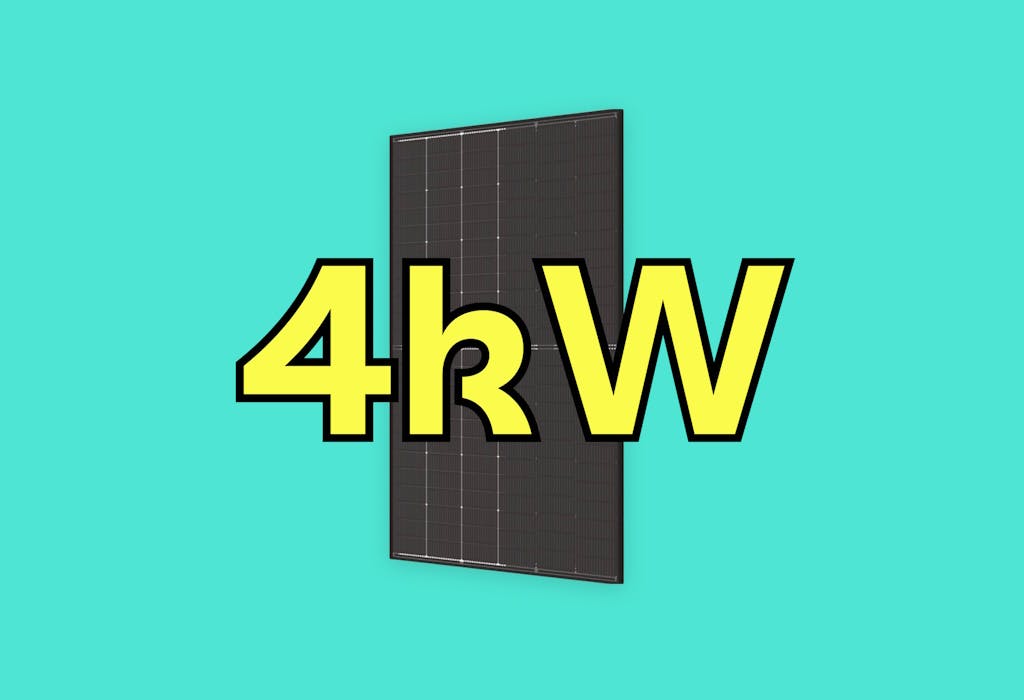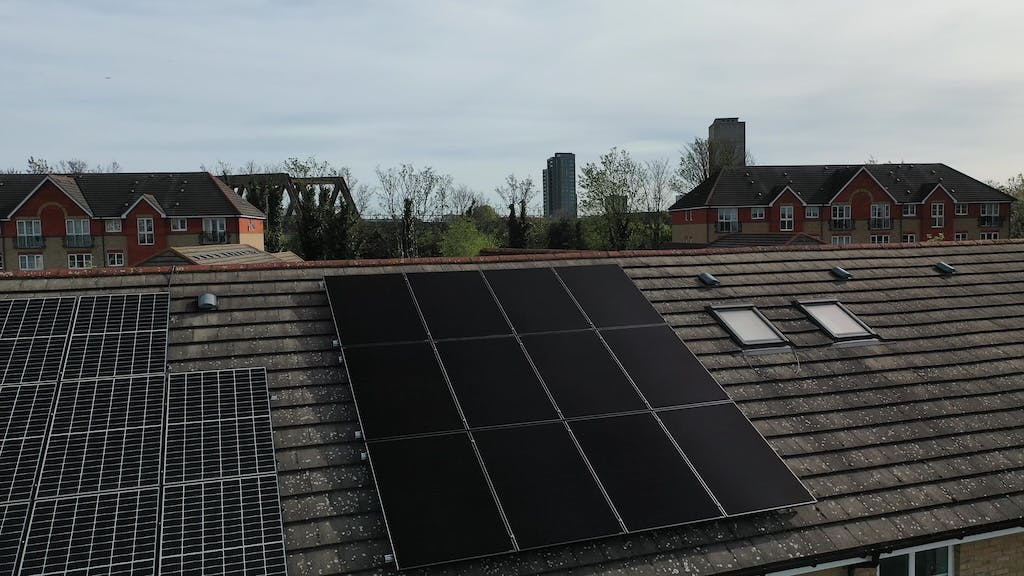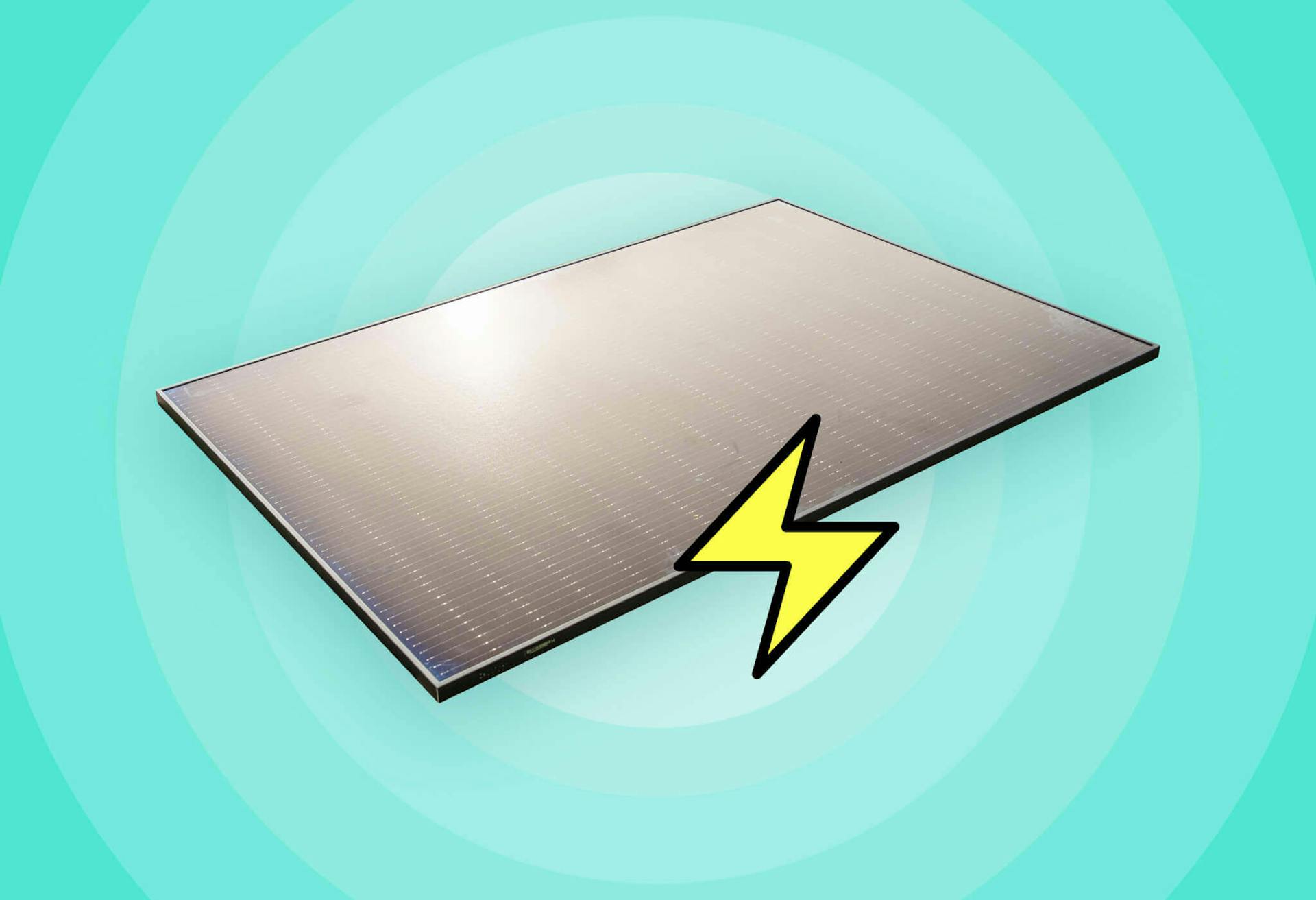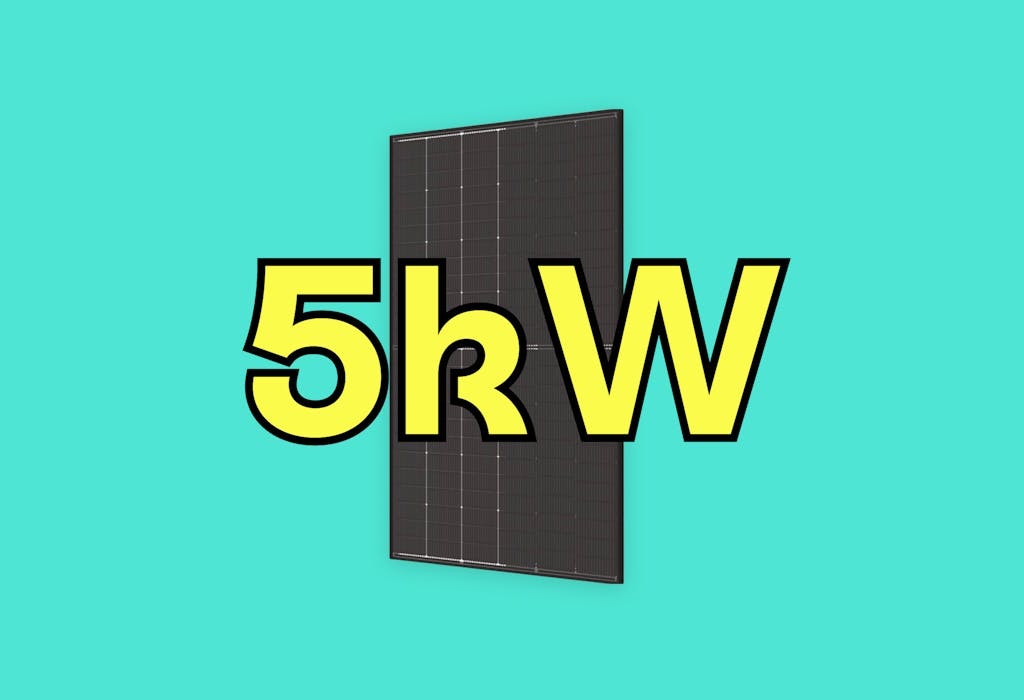- Solar advice hub
- System-size
- 4kW solar panel systems: an expert guide
4kW solar panel systems: an expert guide
In this guide, we’ll explain what a 4kW solar panel system is, how much it costs, and how many devices it can power.


Why you can trust our content
We know that the solar industry is full of misinformation, but we only use reliable sources, including:
- Our experienced solar experts, installers and system designers
- Our own database of solar & battery system designs
- Authoritative bodies like MCS and the UK government




At a glance
When you’re looking to buy a solar panel system, you want to make sure it’s the right size for your home’s needs.
A 4kW solar panel system is often the right choice for a three-bedroom household, but it depends on your present and future consumption, as well as the solar battery you choose.
In this guide, we’ll explain what a 4kW solar panel system is, how much it costs, and how many devices it can power.
If you would like to see the savings you could get from a solar & battery system, just answer a few quick questions below and we'll generate an estimate for you.
What is a 4kW solar panel system?
A 4kW solar panel system has a peak power rating of four kilowatts, meaning it would produce 4,000 kilowatt-hours (kWh) of electricity per year in standard test conditions.
You can build a 4kW system by purchasing solar panels with peak output ratings that add up to 4,000 watts (W).
This doesn’t mean your system will automatically produce 4,000kWh, as solar panel output depends on factors like your location, roof angle and direction, and the quality of the gear.
You may also see a 4kW system referred to as a 4kWp (kilowatt peak) system. In this context, they mean the same thing.
How many solar panels are in a 4kW system?
The number of solar panels in a 4kW system depends on the size of the panels themselves.
If you have a 400W panel, it will produce 400 watt-hours in standard test conditions, which includes a cell temperature of 25°C and solar irradiance of 1,000W per m², and is how every company checks a solar panel’s capabilities.
If you have 10 of these 400W panels, you'll have a 4kW system, which produces 4,000kWh per year under these conditions.
The higher your panels' peak output ratings, the more electricity your panels will produce, everything else being equal – and the more money you'll save.
This table shows how many panels you’d need (of different panel sizes) to create a system that is at least 4kWp.
| Panel size (W) | Number of panels | System size (kWp) |
|---|---|---|
| 350 | 12 | 4.2 |
| 380 | 11 | 4.18 |
| 400 | 10 | 4 |
| 430 | 10 | 4.3 |
| 450 | 9 | 4.05 |
What size battery should you add to a 4kW system?
You should usually add a 5-6kWh battery to a 4kW solar panel system.
This will allow you to store your excess solar energy all year round, to use on cloudy days and after the sun goes down.
You’ll hold onto more of the plentiful energy your solar panels produce in spring and summer, and make the most of the electricity they generate in autumn and winter, to minimise wasted energy.
The size of battery you need will depend on several factors though, including how much electricity your household uses per day, and whether you use more in summer or winter.
If you have air conditioning, for instance, you may consume more of your solar electricity in summer than most homes, which could mean you won't make much use of a large battery.
Your battery’s size will also depend on how long you spend at home during the daytime. For example, if your household spends most days in an office or at school, you may need a bigger battery, since you won’t be using most of the solar electricity as it’s produced.
To learn more, check out our guide to solar battery sizing.
What size inverter should you add to a 4kW system?
Your solar panel system should be 50% bigger than your inverter, as a rule – so for a 4kW system you’ll roughly need a 3kW inverter.
This is because in the UK, your solar panels won’t usually reach their peak power rating, due to our weather generally falling short of standard test conditions.
A 4kW system in this country can still save you hundreds of pounds with the amount of electricity it produces, but won’t produce much more than 4,000kWh per year in the sunniest parts of the UK, on optimum roofs.
And it’s more efficient to pick an inverter size that matches your system’s actual output, rather than what your system can produce in an ideal scenario.
Every inverter requires a minimum level of power to start working, known as its 'startup voltage', and if you have an inverter that's too large, you may struggle to reach the startup voltage.
With this knowledge, you can discuss and understand the reasons behind your inverter’s size with your installer, though you should ultimately leave the decision with them.

The UK's first solar subscription
- No upfront cost
- Fixed monthly fee
- 20-year Sunsave Guarantee
How much does a 4kW solar panel system cost?
A 4kW solar panel system costs around £9,500 to buy and install.
If you want to include a battery in the installation, this will add around £2,000 to the price, for an overall cost of £11,500.
This amount can vary significantly though, depending on factors including the installer you choose, where you live, the type of roof you have, and the current state of the industry.
If you want to learn more, check out our full guide to solar panel costs.

How much energy will a 4kW solar panel system generate?
| Location | Solar irradiance (kWh/kWp) | Average annual output of a 4kWp system (kWh) |
|---|---|---|
| Glasgow | 788 | 3,152 |
| York | 901 | 3,604 |
| Birmingham | 912 | 3,648 |
| London | 960 | 3,840 |
| Exeter | 1,000 | 4,000 |
A 4kW solar panel system in the UK will produce an annual output of around 3,400kWh, in average UK irradiance.
This means you’ll usually produce roughly 85% of your system’s peak power output – but as you can see above, these figures vary significantly, depending on where you live.
Your system will generally produce lower amounts of solar electricity in places with less sunshine, like Scotland or northern England, or more if you live in relatively sunny areas, like Cornwall, Essex, Kent, and Sussex.
Output can even vary in the same area, because location is just one part of the equation. There are many other factors at play, including the quality of your system, the direction and angle of your roof, and how much shading there is on your system.
The table above shows that a 4kW system in Exeter will produce 4,000kWh per year on average, according to the European Commission's Photovoltaic Geographical Information System, but that is just an average.
One 4.3kW solar panel array we designed for an Exeter home has an estimated total output of 4,811kWh, which is far above the 4,300kWh Exeter average for that system.
To get an accurate idea of how much solar electricity you can generate with a 4kW rooftop system, you'll need to use a top solar panel installer.
What can a 4kW solar panel system run?
A 4kW solar panel system can run the average three-bedroom household, on a typical day.
It can usually generate around 9.3kWh of solar electricity per day in the UK.
This amount of electricity can power all of the following devices for the stated amount of time, according to Centre for Sustainable Energy data – and still have 1kWh left over.
| Device | Time | kWh usage |
|---|---|---|
| Washing machine | 1 hour | 2.1 |
| Tumble dryer | 1 hour | 2.5 |
| Electric shower | 15 minutes | 0.22 |
| Hairdryer | 10 minutes | 0.3 |
| Oven | 45 minutes | 1.58 |
| Toaster | 2 minutes | 0.03 |
| Microwave | 5 minutes | 0.05 |
| TV | 2 hours | 0.24 |
| Games console | 2 hours | 0.24 |
| 2 laptops | 8 hours each | 0.8 |
| 10-watt LED light bulbs | 17 hours | 0.23 |
| Total: 8.29 |
Is a 4kW solar panel system enough?
A 4kW solar panel system is usually enough for a house that uses the average amount of electricity in the UK, which is 3,400kWh.
This table shows how many 400W panels a household should get, based on the idea that you want your system's solar output to exceed your home's electricity usage.
| Annual electricity consumption (kWh) | Number of solar panels (400W) | System size (kWp) | Average annual output (kWh) |
|---|---|---|---|
| 2,500 | 8 | 3.2 | 2,720 |
| 3,000 | 9 | 3.6 | 3,060 |
| 3,500 | 10 | 4 | 3,400 |
| 4,000 | 12 | 4.8 | 4,080 |
| 4,500 | 14 | 5.6 | 4,760 |
If you get a solar panel system that produces more electricity than you consume, you can use most of it to cut your bills.
You won't be able to use all of it, since your system will sometimes generate more electricity than you could consume, even with a battery. This is often the case on sunny summer days.
Thankfully, you can send this excess power to the grid through a solar export tariff, potentially earning hundreds of pounds per year.
If you want to learn more, read our guide to working out how many solar panels you need.
However, you should always look to get a larger solar panel system, if you can afford to.
The fixed prices of scaffolding and labour usually make up a large part of your costs, so adding more panels doesn’t push up the overall amount by much, which means it makes financial sense to maximise your roof space, in most cases.
How much space do you need for a 4kW solar panel system?
You’ll need 28.8 square metres (m²) of roof space for a 4kW solar panel system, on average.
This takes into account the average height and width of a solar panel, which is around two square metres, as well as the extra spaces installers usually leave.
Your solar engineer will typically make sure there’s a 40cm gap between the panels and the sides of your roof, and a 3cm space between each panel, to match standards created by bodies like Flexi-Orb and Microgeneration Certification Scheme (MCS).
If you have a chimney, vent pipe, or skylight (also known as a Velux window), you’ll need a bit more space – but not too much.
If you have all three, you’ll usually need another 0.81m², for a total of 29.6m².
Is a 4kW solar panel system worth it?
A 4kW solar panel system is absolutely worth it, as long as it’s the correct size for your household.
If it is, it’ll bring you various benefits. You’ll cut your electricity bills by 103%, on average, which means across a year you actually earn more than you spend. This might sound too good to be true, but it’s all because of the high performance of modern solar panels and storage batteries, as well as export income.
The panels will dramatically reduce the amount of electricity you buy from the grid, and you’ll also earn money by selling your unused electricity to the grid.
This 103% figure is based on a household experiencing average UK irradiance with a 4.4 kilowatt-peak (kWp) solar panel system and a 5.2 kilowatt-hour (kWh) battery, using 3,500kWh of electricity each year and signed up to the Intelligent Octopus Flux export tariff.

You’ll also cut your carbon footprint by 1.1 tonnes of CO2 per year, on average - or 31%. This is based on a database of 32 different solar & battery systems designed by Sunsave, located across England and Wales. Each system uses 430W solar panels and a 5.8kWh battery.
It's a 31% reduction because the average UK household carbon footprint is 3.5 tonnes per year. This figure is based on a government report that households account for 26% of the UK’s carbon footprint, the country’s latest emissions total of 384.2 million tonnes, and the fact that there are 28.2 million households across the nation at the last count.
A 4kW solar panel system can also increase your home’s value.
For the average home, solar panels increase the Energy Performance Certificate (EPC) rating by at least one grade, and homes with a higher EPC rating tend to sell for more. For instance, in research from 2023, Rightmove found that increasing a property’s EPC from a D to C lifts its value by 3% (or £11,157), on average.
Do you need planning permission for a 4kW solar panel system?
You don’t usually need planning permission to install solar panels on a domestic property, including 4kW systems.
Solar installations on households are almost always protected by permitted development rights, which allow homeowners to make medium-sized improvements without planning permission.
You’ll normally only have to apply if you live in a flat, listed building, or a conservation area – or if you want to get a ground-mounted installation.
However, your installer will need to submit a G99 application to your region’s Distribution Network Operator (DNO) if your inverter’s maximum capacity is over 3.68kW on a single-phase system.
This won’t typically be the case with a 4kW installation, as your solar panel system should be 50% bigger than your inverter – but some installers will recommend a larger inverter, which would trigger this requirement.
If it is needed, a G99 application should be a harmless formality that simply ensures the DNO is aware of your system, and able to use that information to run its grid properly.
Can you get an off-grid 4kW solar panel system?
You can definitely get an off-grid 4kW solar panel system installed, and it can supply a large chunk of the electricity you need.
As you’re not able to export excess energy to the grid, you’ll need a large battery to hold onto as much electricity as possible.
Depending on your location and energy consumption, an 8-10kWh battery will probably suit your needs.
In any case, you may need to supplement a 4kW system with other renewable sources, like wind.
A 4kW solar panel system will only supply you with enough electricity to live off-grid if you’re prepared to keep a close eye on your consumption and use a lot less energy in winter.
Next steps
A 4kW solar panel system is a standard size for a household with three or four bedrooms, and can massively cut your electricity bills.
However, most homes don’t align with ‘the average’, and the size of your system should depend on your current and future electricity consumption, not industry averages.
The best way to get exactly the right size of solar panel system for your home is to hire a solar panel company with the relevant expertise and abilities, like Sunsave.
If you’re interested in how much you could save with a solar & battery system, simply answer a few quick questions below, and we’ll calculate an estimate.
4kW solar panel system: FAQs
Related articles

How many solar panels do I need?
Read full story
How much energy do solar panels produce?
Read full story
5kW solar panel systems: an expert guide
Read full story
Should you get a solar panel subscription?
Read full story
Written byJosh Jackman
Josh has written about the rapid rise of home solar for the past six years. His data-driven work has been featured in United Nations and World Health Organisation documents, as well as publications including The Eco Experts, Financial Times, The Independent, The Telegraph, The Times, and The Sun. Josh has also been interviewed as a renewables expert on BBC One’s Rip-Off Britain, ITV1’s Tonight show, and BBC Radio 4 and 5.